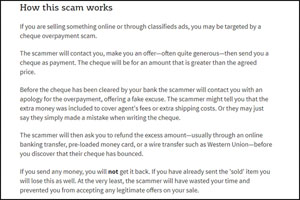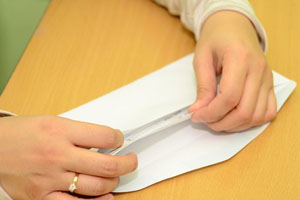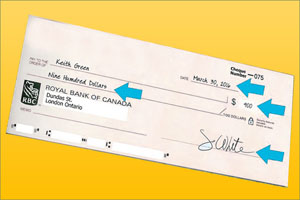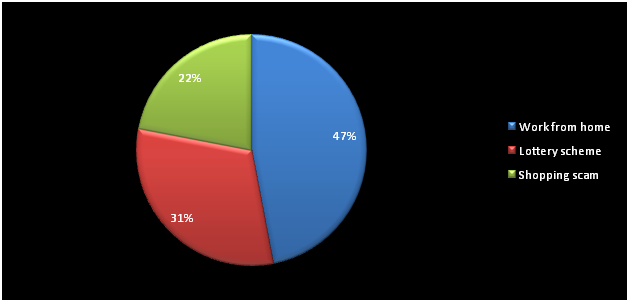Check Overpayment Scams
A check overpayment scam typically involves someone you’re dealing with sending a check for more than the agreed amount. They’ll then ask you to return the excess funds, often through a wire transfer. In some variations, they might tell you to deposit the check, keep a portion as your payment, and send the rest back for a supposed reason. In both scenarios, the check eventually bounces, and you’re held liable for the entire amount, including the money you already sent to the scammer.

The Federal Trade Commission (FTC) is warning consumers about a dangerous and increasingly common scheme known as the “check overpayment” scam, which has become one of the most widespread internet frauds today.
In this scam, fraudsters typically target individuals selling items online through auction sites or classified ads. The scammers provide seemingly legitimate reasons for overpaying and politely request that the excess amount be returned via wire transfer. To help raise awareness and report such fraudulent activity, several websites now offer resources and links for submitting complaints and identifying scam behavior.
Cautions:
The checks used in this scam are counterfeit, but they often appear so authentic that they can deceive even experienced bank employees. This makes the scam particularly dangerous and a serious issue that should not be overlooked.

Tips to avoid Check Overpayment Scams:
? Do you really know who you're dealing with? Always take the time to independently verify the buyer’s full name, physical address, and phone number.
? Are you being offered a check for more than your item’s price? If so, decline the offer—no matter how reasonable or appealing the explanation may sound.
? Why would someone sending you money ask you to send some back? That’s a red flag—there’s no valid reason for such a request.
DID YOU KNOW ABOUT CHECK OVERPAYMENT SCAM?
Ways to avoid check overpayment scam:
-
Always get the accurate contact details of the buyer and cross-check them twice.
-
Never agree to an overpayment for anything that you sell. Scammers' main motive is to get funds from you in the name of wiring back extra money.
-
Avoid accepting checks as payment when you are selling something online. Insist on online fund transfers or other safe modes of payment.
-
If you accept payment by check, ask for a check drawn on a local bank or a bank with a local branch. You can visit that bank branch to determine if the check is legitimate.
-
Never get carried away by any free lottery scheme offers. Scammers lure you to pay first and then give you nothing in return.
-
Cancel the transaction immediately if you are asked to wire funds back to the buyer.
-
File a complaint with the authorities if you receive any fictitious checks.
-
Consumers are advised to do proper homework on the potential employer before making any transactions.
-
Cross-check and verify the legitimacy of the check with your nearest bank.
-
Never get carried away or act hurriedly on any offer.

Variations in Check Overpayment Scam
? Work-from-Home Scam:
In the work-from-home check overpayment scam, scammers target individuals seeking remote job opportunities. They assign tasks to the employee and, when it’s time to pay, send a fake check with an overpayment. The employee is then asked to wire the excess amount back to the supposed employer. Once the money is sent, the scammer disappears, leaving the individual without pay and out of pocket for the amount wired—along with the work completed for the scammer.
? The Lottery Scheme:
In this scam, fraudsters send bulk emails claiming that recipients have won a foreign lottery. They often include a counterfeit or fake check to make the claim appear legitimate. The scammer inflates the check amount and asks the "winner" to wire back the excess funds. Victims who fall for the fake lottery scheme end up losing their money to the scammer.
? Shopping Overpayment Scam:
In the shopping overpayment scam, scammers pose as buyers interested in products such as cars, TVs, or trucks. They send the seller a fake check for more than the agreed price and ask them to wire back the overpaid amount. After the seller deposits the check and sends back the excess funds, they discover the check was fraudulent and that they’ve been scammed.
? Secret Shopper Scams:
In this scam, a consumer is hired as a "secret shopper" to evaluate a money transfer service. The individual receives a check and is instructed to deposit it, withdraw the cash, and send it through the specified transfer service—usually to someone in a Canadian city. They are also asked to provide feedback on the experience. However, the evaluation is never collected. The entire scenario is a ruse to steal the consumer’s money.


Statistics on Check overpayment scam:
Pie chart showing variations in check overpayment scam:
It is inferred that the majority of check overpayment scams are carried out through work-from-home schemes, followed by the well-known foreign lottery scam, and then the shopping overpayment scam. Most victims fall prey to the work-from-home variation, where they end up wiring money back to scammers under the pretense of returning excess funds.

Examples of check overpayment scam:



Feel Free to use our Spam Checker Tool
We are providing the Spam Checker Tool for your convenience. You can enter any email address or contact number you suspect to be a scam. This tool checks it against our spam database and informs you whether the email or phone number is legitimate or fraudulent.
You can also report scams to the United States government by filing a complaint about the scam or any related crime through the appropriate channels.

